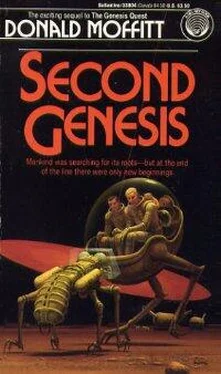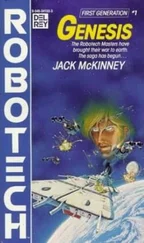“They’re awfully close to the rim edge, aren’t they?” Trist observed, his face suddenly alight with interest.
“Yes, aren’t they?” Jun Davd said.
The spark died without warning. Bram could see the ship itself, a tiny splinter that he knew was twenty miles long from end to end. The cluster of bubbles at one end didn’t seem appreciably smaller. It was hard to tell. The few dozen that might have been expended on this world still left hundreds with which to seed the rest of the system.
“They’re not cutting it too fine,” Jun Davd drawled. “They’re about a half million miles from their first colony next to our digs. They’re closing at a hundred miles per second. It won’t be many minutes longer now.”
The ellipsoidal moon hovered, waiting. The dragonfly ship was going to pass under its pointed end. Even at the scale of distance involved, the progress of the bubble-ended splinter seemed swift.
“They’re going to—” Mim said, and bit her lip.
The splinter hurtled onward, its axis aimed obliquely in preparation for the escape orbit that would take it to the next big disk of the outer trio. The angle gave it a wider cross section along its line of flight. That would make matters worse, Bram thought.
At the last moment, a dragonfly eye must have seen a hairline flicker of movement and a dragonfly brain must have made an instantaneous connection. The fusion flame flared in a desperate attempt to push the ship out of the plane of the disk.
“That was a mistake,” Jun Davd said.
The splinter sheared in half, peeling back along its entire length. Hundreds of tiny glistening beads spilled into space. Bram thought that a collision at a hundred miles per second would have smeared the occupants to paste, but—incredibly—he could see chemical jets starting up in some of them as the pilots tried uselessly to save themselves.
Then the primitive deuterium-helium three reactor—smashed, flooded, and compressed all at once—blew.
A ball of terrible fire appeared in an instant, engulfing the spilled bubbles, spreading outward in growing circles across the diskscape, lighting up the underside of the pointed moon.
The moon gave a jerk.
It joggled for a moment, like a balloon being yanked by a child, and then the second set of moonropes on the other side of the rim, weakened by heat and impossibly stressed, parted.
Like a stone released from a sling, the moon flew into space.
Mim gasped. She clutched at Bram’s arm, her fingers digging into his biceps.
“It can’t hit us, Mim,” Bram said softly, watching the moon sail upward, blunt end first. “It left the disk’s orbit on a different tangent than we did.”
Jun Davd heard him. “No, there’s nothing left in the outer system that it can hit. It will probably take up a tilted orbit somewhere between here and the cometary halo.”
Slowly, like ocean billows, the surface of the diskworld collapsed under the place where the moon had hung. A great scalloped depression spread out on either side. Eventually, when that wave of collapse ceased, there would be a forty-five-million-mile bite taken out of the disk between moons.
Throughout the lounge, sobs were heard as stunned people realized that the city of man had tumbled into that abyss.
“It’s all gone, isn’t it?” Mim asked. “Everything we found. Buried, crushed under an earthquake that could have swallowed worlds.”
Bram found her hand. “ They’re gone too, Mim. The dragonflies.”
“They’ll be back, though,” Trist said, staring out the curving view wall as the universe outside came tumbling down. “There are billions of them, less than twenty light-years away.”
Bram’s holo, fifty feet tall, stood on the rostrum and looked out across a sea of faces. It always made him feel self-conscious to be magnified this way—you didn’t even dare to scratch your nose—but it was the only way for a crowd this size to have any connection with the speakers. He thanked his stars that the year-captain election was only a few Tendays away. He had resolved not to let his name be entered this time. It was someone else’s turn.
The hall of the tree had been enlarged over the years with the increase in population, until now it could seat more than twenty thousand people. But that still wasn’t enough to handle the crowd that had shown up tonight; the overflow had been consigned to the small adjacent amphitheater, watching the same holos, but without the reinforcing sight of the distant minikin figures whose shadows they were.
Over two hundred ushers with ballot boxes on poles were stationed at the ends of the aisles, each responsible for ten rows. This was a vote that nobody was going to miss.
“All right, I guess we’ve heard from everyone who said they wanted to speak—and a few who said they didn’t,” he said, while the simulacrum of himself that towered over him boomed out the words through the sound system. “And I guess the experts have answered all our questions. So I’m going to call on Jun Davd to sum it up, and then we can get on with the vote.”
He left the podium to sit with Mim and the others, mopping his brow a little too soon, so that a departing slice of the holo image made a swipe with a bedsheet-size handkerchief before he was completely offstage.
Jun Davd nodded as he squeezed past, then got up and took his place on the podium. His holo image, lithe with the common youth of the human race, leaned toward the crowd and said mildly, “We’re still on the previously set course that will take us to the star we believe to be Sol. If we want to change that course, we should do so now. We’ve reached approximately one-fortieth of the speed of light, and within a few more days we’ll be beyond the effective limits of this system.”
A vast troubled murmuring went through the audience, and voices were raised in different parts of the hall.
Jun Davd’s holo raised a billboard palm. “Please, we’ve been through it all before. We believe that all the nearby stars, to a distance of about twenty light-years from Sol, are—or soon will be—inhabited by our dragonfly successors on earth. If that’s the case, we have no home here. There is a sizable faction among us who want to flee this sector of space without further ado and search for a home elsewhere in the galaxy. And I can’t say I blame them, after what we’ve seen here.”
There were shouts of agreement from the crowd. A man near the front rose, shaking his fist, and was shushed by his neighbors.
“But there is another faction,” Jun Davd went on, “who believe we should have a look at Sol anyway. We’ve heard from some of them tonight. They argue that we can’t know for sure that our recent adversaries come from Earth, though all the biological studies indicate that they do. What if we’re mistaken? What if Earth is not denied to us? What if the dragonfly ship came from elsewhere or was a lone survivor fleeing some planetary disaster? In that case, it would be a shame to have journeyed so far without even getting a glimpse of our goal.”
There were more angry shouts from the audience. Jun Davd’s looming holo waited them out, hands on its hips.
“There’s one more thing to consider,” he said when the noise subsided. “Even if the worst is true, oughtn’t we to know more about these terrifying creatures? How far have they advanced since they launched their colony ship? How fast are they likely to spread? How far ought we to flee before we’re safe? A thousand light-years? Ten thousand? To the opposite side of the galaxy? And when we get there, will we find them waiting for us—having arrived in ships that set out centuries after we did but were a few decimal places faster?”
That got to everybody. A subdued silence fell over the massed rows as Jun Davd went on.
Читать дальше












